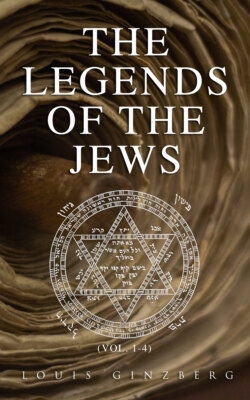Читать книгу The Legends of the Jews (Vol. 1-4) - Louis Ginzberg Ginzberg - Страница 55
На сайте Литреса книга снята с продажи.
NOAH LEAVES THE ARK
ОглавлениеThough the earth assumed its old form at the end of the year of punishment, Noah did not abandon the ark until he received the command of God to leave it. He said to himself, "As I entered the ark at the bidding of God, so I will leave it only at His bidding." Yet, when God bade Noah go out of the ark, he refused, because he feared that after he had lived upon the dry land for some time, and begotten children, God would bring another flood. He therefore would not leave the ark until God swore He would never visit the earth with a flood again.
When he stepped out from the ark into the open, he began to weep bitterly at sight of the enormous ravages wrought by the flood, and he said to God: "O Lord of the world! Thou art called the Merciful, and Thou shouldst have had mercy upon Thy creatures." God answered, and said: "O thou foolish shepherd, now thou speakest to Me. Thou didst not so when I addressed kind words to thee, saying: 'I saw thee as a righteous man and perfect in thy generation, and I will bring the flood upon the earth to destroy all flesh. Make an ark for thyself of gopher wood.' Thus spake I to thee, telling thee all these circumstances, that thou mightest entreat mercy for the earth. But thou, as soon as thou didst hear that thou wouldst be rescued in the ark, thou didst not concern thyself about the ruin that would strike the earth. Thou didst but build an ark for thyself, in which thou wast saved. Now that the earth is wasted, thou openest thy mouth to supplicate and pray."
Noah realized that he had been guilty of folly. To propitiate God and acknowledge his sin, he brought a sacrifice. God accepted the offering with favor, whence he is called by his name Noah. The sacrifice was not offered by Noah with his own hands; the priestly services connected with it were performed by his son Shem. There was a reason for this. One day in the ark Noah forgot to give his ration to the lion, and the hungry beast struck him so violent a blow with his paw that he was lame forever after, and, having a bodily defect, he was not permitted to do the offices of a priest.
The sacrifices consisted of an ox, a sheep, a goat, two turtle doves, and two young pigeons. Noah had chosen these kinds because he supposed they were appointed for sacrifices, seeing that God had commanded him to take seven pairs of them into the ark with him. The altar was erected in the same place on which Adam and Cain and Abel had brought their sacrifices, and on which later the altar was to be in the sanctuary at Jerusalem.
After the sacrifice was completed, God blessed Noah and his sons. He made them to be rulers of the world as Adam had been, and He gave them a command, saying, "Be fruitful and multiply upon the earth," for during their sojourn in the ark, the two sexes, of men and animals alike, had lived apart from each other, because while a public calamity rages continence is becoming even to those who are left unscathed. This law of conduct had been violated by none in the ark except by Ham, by the dog, and by the raven. They all received a punishment. Ham's was that his descendants were men of dark-hued skin.
As a token that He would destroy the earth no more, God set His bow in the cloud. Even if men should be steeped in sin again, the bow proclaims to them that their sins will cause no harm to the world. Times came in the course of the ages when men were pious enough not to have to live in dread of punishment. In such times the bow was not visible.
God accorded permission to Noah and his descendants to use the flesh of animals for food, which had been forbidden from the time of Adam until then. But they were to abstain from the use of blood. He ordained the seven Noachian laws, the observance of which is incumbent upon all men, not upon Israel alone. God enjoined particularly the command against the shedding of human blood. Whoso would shed man's blood, his blood would be shed. Even if human judges let the guilty man go free, his punishment would overtake him. He would die an unnatural death, such as he had inflicted upon his fellow-man. Yea, even beasts that slew men, even of them would the life of men be required.
